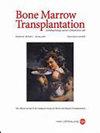Mismatched unrelated donors allogeneic hematopoietic stem cell transplantation with antithymocyte globulin for hematological malignancies: a multicenter retrospective study in China
IF 4.5
2区 医学
Q1 HEMATOLOGY
引用次数: 0
Abstract
Allogeneic hematopoietic stem cell transplantation (allo-HSCT) utilizing mismatched unrelated donors (MMUD) present a vital option for patients with hematologic malignancies without human leukocyte antigen (HLA)-matched donors. This multicenter retrospective study encompassed 211 adults with hematological malignancies receiving allo-HSCT with antithymocyte globulin (ATG) from ≥1 HLA locus MMUD. The findings revealed cumulative incidences of II-IV acute graft-versus-host disease (GVHD) at 180 days at 26.5%, and III-IV acute GVHD at 12.3%, with 3-year cumulative incidences for total and moderate-severe chronic GVHD at 37.0% and 21.0%. The 3-year non-relapse mortality (NRM) and relapse rates were 19.7% and 25.8%. The study reported a 3-year overall survival (OS) rate of 63.1%, a disease-free survival (DFS) rate of 54.5%, and a GVHD-free, relapse-free survival (GRFS) rate of 40.8%. Administration of a lower-dose ATG-Genzyme (ATG-G, ≤ 6 mg/kg) correlated with improved engraftment without significantly affecting survival, relapse, or viral reactivation rates. The quantity of HLA mismatches did not impact engraftment, GVHD, viral reactivation, OS, DFS, GRFS, relapse, or NRM. In conclusion, MMUD allo-HSCT with ATG demonstrates favorable outcomes for patients with hematological malignancies, with no evident correlation between the degree of mismatch and post-transplantation results. Utilizing a lower dose of ATG-G ( ≤ 6 mg/kg) proved efficacious, delivering comparable clinical advantage.

中国一项多中心回顾性研究:血液恶性肿瘤的非血缘关系匹配供体异基因造血干细胞移植与抗胸腺细胞球蛋白。
对于没有人类白细胞抗原(HLA)匹配供体的血液恶性肿瘤患者来说,利用错配非亲属供体(MMUD)进行异基因造血干细胞移植(allo-HSCT)是一个重要的选择。这项多中心回顾性研究涵盖了 211 名接受异体 HSCT 的成人血液恶性肿瘤患者,他们都接受了来自≥1 个 HLA 位点 MMUD 的抗胸腺细胞球蛋白 (ATG)。研究结果显示,180 天内Ⅱ-Ⅳ度急性移植物抗宿主疾病(GVHD)的累计发病率为 26.5%,Ⅲ-Ⅳ度急性 GVHD 为 12.3%,3 年内总 GVHD 和中度严重慢性 GVHD 的累计发病率分别为 37.0% 和 21.0%。3年非复发死亡率(NRM)和复发率分别为19.7%和25.8%。研究报告显示,3年总生存率(OS)为63.1%,无病生存率(DFS)为54.5%,无GVHD、无复发生存率(GRFS)为40.8%。使用低剂量的ATG-酵素(ATG-G,≤ 6 mg/kg)可改善移植效果,但对存活率、复发率或病毒再活化率无明显影响。HLA错配的数量不会影响移植、GVHD、病毒再活化、OS、DFS、GRFS、复发或NRM。总之,使用 ATG 的 MMUD allo-HSCT 为血液恶性肿瘤患者带来了良好的治疗效果,错配程度与移植后效果之间没有明显的相关性。事实证明,使用较低剂量的ATG-G(≤ 6 mg/kg)是有效的,能带来类似的临床优势。
本文章由计算机程序翻译,如有差异,请以英文原文为准。
求助全文
约1分钟内获得全文
求助全文
来源期刊

Bone Marrow Transplantation
医学-免疫学
CiteScore
8.40
自引率
8.30%
发文量
337
审稿时长
6 months
期刊介绍:
Bone Marrow Transplantation publishes high quality, peer reviewed original research that addresses all aspects of basic biology and clinical use of haemopoietic stem cell transplantation.
The broad scope of the journal thus encompasses topics such as stem cell biology, e.g., kinetics and cytokine control, transplantation immunology e.g., HLA and matching techniques, translational research, and clinical results of specific transplant protocols. Bone Marrow Transplantation publishes 24 issues a year.
 求助内容:
求助内容: 应助结果提醒方式:
应助结果提醒方式:


